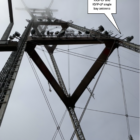Google, the Silicon Valley startup that quickly dominated the global search engine business, gained credibility early on with users by invoking its informal motto: “Don’t be evil.”
But consumer groups last week turned the slogan against the company, saying the economics of the digital world have obscured its moral compass.
Google united with Verizon last week to bring before the Federal Communications Commission a list of proposals that consumer groups said seemed to water down the principle of network neutrality — the concept that all Internet traffic should be handled equally, regardless of who provides it or how much they can pay.
Advocates say that these proposals compromise the FCC’s legitimate role in protecting a free and open Internet.
Consumer groups held a protest at noon Friday at Google’s Mountain View headquarters. Around 50 people joined advocates from Colorofchange.org, Moveon.org, Savetheinternet.com and the political a cappella singing group Raging Grannies.
Amid signs reading “Save the Internet” and “Don’t Be Evil,” the Raging Grannies led farcical songs of protest such as, “God Bless the Internet.”
James Rucker, co-founder and executive director of Colorofchange.org, a website dedicated to preserving a political voice for African Americans, said political diversity on the Web is imperiled by current proposals.
“The Internet has been the ground on which we can do real work, we can communicate across communities, can hold politicians accountable,” Rucker said. He accused Google of trying to create a new, second Internet for the wealthy.
“Google and Verizon have put forth a plan that, while saying it will protect the open Internet, it actually does quite the opposite,” he said. “They’re talking about building a separate fast lane, essentially. A higher tier for premium content, which means if you want to play in the 21st century Internet that is upon us, you’re going to have to pay.”
Google responds to its critics by saying that the joint proposal with Verizon would extend stricter regulation by the FCC over wired broadband connections, such as cable modems and DSL service. But it would also exempt wireless services, the fastest growing category of online connections. The New York Times reported Monday that experts conclude that wireless companies would have to install 1o times as many cellular towers as are currently in place to satisfy demand for cell phone broadband.
Advocates said that until recently Google was their ally in supporting strict net neutrality, and that the turn-around was “stunning.”
Google says its approach is not a violation of its former position, and that wireless services are fundamentally different because they are so fast-changing. “We don’t view this as a retreat at all,” Alan Davidson, Google’s director of Public Policy, told the Times. “Google believes very strongly in net neutrality.”
John Thielking of San Jose came out to the protest because he has a website on which he reviews movies, and is worried that the Google-Verizon proposal would prevent his site from being seen.
“It might be harder for people to access my website,” Thielking said. “I think it’s very important that small companies be allowed to distribute their work as easily as the big companies.”
Protesters walked into Google headquarters to deliver three boxes of documents containing 300,000 signatures from people across the country opposing its proposal to the FCC. The groups set up a website to start conversation about the proposals, at www.googlepublicpolicy.blogspot.com.









